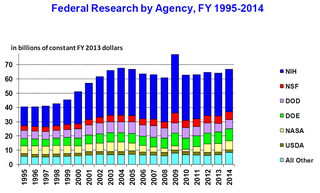Related Research Articles

The National Oceanic and Atmospheric Administration is a scientific and regulatory agency within the Washington, D.C.–based United States Department of Commerce, headquartered in Silver Spring, Maryland.

The National Technical Information Service (NTIS) is an agency within the U.S. Department of Commerce. The primary mission of NTIS is to collect and organize scientific, technical, engineering, and business information generated by U.S. government-sponsored research and development, for private industry, government, academia, and the public. The systems, equipment, financial structure, and specialized staff skills that NTIS maintains to undertake its primary mission allow it to provide assistance to other agencies requiring such specialized resources.
A work of the United States government is defined by the United States copyright law, as "a work prepared by an officer or employee of the United States Government as part of that person's official duties". Under section 105 of the Copyright Act of 1976, such works are not entitled to domestic copyright protection under U.S. law and are therefore in the public domain.

The Office of Scientific and Technical Information (OSTI) is a component of the Office of Science within the U.S. Department of Energy (DOE). The Energy Policy Act PL 109–58, Section 982, called out the responsibility of OSTI: "The Secretary, through the Office of Scientific and Technical Information, shall maintain with the Department publicly available collections of scientific and technical information resulting from research, development, demonstration, and commercial applications activities supported by the Department."

The Office of Local Defense Community Cooperation (OLDCC), formerly the Office of Economic Adjustment (OEA), is a United States Department of Defense (DoD) field activity and provides technical and financial assistance to states, territories, and communities that are invested in the defense mission. OLDCC assistance supports the readiness and resiliency of both defense installations and defense communities.

The Organized Crime Drug Enforcement Task Force (OCDETF) is a federal drug enforcement program in the United States, overseen by the Attorney General and the Department of Justice. The principal mission of the OCDETF program is to identify, disrupt, and dismantle the major drug trafficking operations and tackle related crimes, such as money laundering, tax and weapon violations, and violent crime, and prosecute those primarily responsible for the nation's drug supply.

The Office of Intelligence and Counterintelligence (OICI), also abbreviated IN, DOE-IN, DOE/IN, I&CI, or OIC, was established in 2006 by the merger of pre-existing Energy Department intelligence and security organizations. It is an office of the United States Department of Energy (DOE) responsible for all intelligence and counterintelligence activities throughout the DOE complex; due to this central role, OICI is designated DOE's Headquarters Intelligence. As a component of the United States Intelligence Community in addition to the Department of Energy, OICI reports to both the Director of National Intelligence and Secretary of Energy.

The Federal Geographic Data Committee (FGDC) is a United States government committee which promotes the coordinated development, use, sharing, and dissemination of geospatial data on a national basis. Its 32 members are representatives from the Executive Office of the President, and Cabinet level and independent federal agencies. The secretary of the Department of the Interior chairs the FGDC, with the deputy director for management, Office of Management and Budget (OMB) as vice-chair.
The Scientific and Technical Information (STI) Program of the National Aeronautics and Space Administration (NASA) collects, organizes, preserves, and releases the Agency's scientific and technical information. STI is derived from NASA's research and development efforts and NASA projects, programs, and missions. The program is essential in helping NASA avoid duplication of research, by sharing information to ensure that the U.S. maintains its preeminence in aerospace-related industries and education. Examples of NASA STI include technical papers and reports, contractor reports, conference papers and proceedings, journal articles, presentations, and technical information on websites. NASA STI also includes research information from NASA's predecessor agency, the National Advisory Committee for Aeronautics (NACA), which dates back to 1915 and transitioned to NASA at the advent of the National Aeronautics and Space Act of 1958 (Amended).
The United States Congress established the Joint Planning and Development Office (JPDO) in 2003 to plan and coordinate the development of the Next Generation Air Transportation System (NextGen). The JPDO is a multi-agency public/private initiative to include: United States Department of Transportation, United States Department of Defense, Department of Commerce, Department of Homeland Security, Federal Aviation Administration, National Aeronautics and Space Administrations, and White House Office of Science and Technology Policy. Congress ended funding for JPDO in 2014.
Science.gov is a web portal and specialized search engine. Using federated search technology, Science.gov serves as a gateway to United States government scientific and technical information and research. Currently in its fifth generation, Science.gov provides a search of over 60 databases from 14 federal science agencies and 200 million pages of science information with just one query, and is a gateway to 2,200+ scientific websites.
The United States Global Change Research Program (USGCRP) coordinates and integrates federal research on changes in the global environment and their implications for society. The program began as a presidential initiative in 1989 and was codified by Congress through the Global Change Research Act of 1990, which called for "a comprehensive and integrated United States research program which will assist the Nation and the world to understand, assess, predict, and respond to human-induced and natural processes of global change."
The Energy Citations Database (ECD) was created in 2001 in order to make scientific literature citations, and electronic documents, publicly accessible from U.S. Department of Energy (DOE), and its predecessor agencies, at no cost to the user. This database also contains all the unclassified materials from Energy Research Abstracts. Classified materials are not available to the public. ECD does include the unclassified, unlimited distribution scientific and technical reports from the Department of Energy and its predecessor agencies, the Atomic Energy Commission and the Energy Research and Development Administration. The database is usually updated twice per week.

The Arctic policy of the United States is the foreign policy of the United States in regard to the Arctic region. In addition, the United States' domestic policy toward Alaska is part of its Arctic policy.

The science policy of the United States is the responsibility of many organizations throughout the federal government. Much of the large-scale policy is made through the legislative budget process of enacting the yearly federal budget, although there are other legislative issues that directly involve science, such as energy policy, climate change, and stem cell research. Further decisions are made by the various federal agencies which spend the funds allocated by Congress, either on in-house research or by granting funds to outside organizations and researchers.
The Task Force on New Americans is an interagency initiative to help immigrants learn English, embrace the common core of American civic culture, and fully become American. It was created in June 2006 by President George W. Bush. Established within the Department of Homeland Security, Secretary Michael Chertoff serves as Chair of the Task Force. Membership includes representatives from 12 Cabinet-level departments and a technical working committee of eight additional federal agencies. Alfonso Aguilar, Chief of the Office of Citizenship at U.S. Citizenship and Immigration Services (USCIS), serves as Chair of the Task Force's technical committee. The Task Force has worked to develop interagency initiatives to help immigrants settle in their new country and maximize the use of federal resources in promoting integration. By providing technical resources to communities and organizations, encouraging volunteerism, developing effective training methods, conducting targeted research efforts, and providing recommendations to the President, the Task Force has sought to encourage successful immigrant assimilation in a comprehensive manner. In December 2022 the Biden Administration announced it would relaunch the White House Task Force on New Americans.

The Networking and Information Technology Research and Development (NITRD) program consists of a group of U.S. federal agencies to research and develop information technology (IT) capabilities to empower Federal missions; support U.S. science, engineering, and technology leadership; and bolster U.S. economic competitiveness.
The Federal Statistical System of the United States is the decentralized network of federal agencies which produce data and official statistics about the people, economy, natural resources, and infrastructure of the United States. It is led by the Chief Statistician of the United States (CSOTUS) and the Interagency Council on Statistical Policy, and is composed of 13 principal statistical agencies and 3 recognized statistical units, 24 Statistical Officials, approximately 100 additional Federal statistical programs engaged in statistical activities, and several cross system interagency and advisory bodies.
The Science and Technology Policy Institute is a federally funded research and development center located in Washington, D.C. STPI provides objective research and analysis on science and technology policy issues in support of the White House Office of Science and Technology Policy (OSTP), as well as for its sponsor, the National Science Foundation, and other science-performing federal agencies. STPI is administered by the non-profit Institute for Defense Analyses, located in Alexandria, Virginia. As of May 2020, Kristen Kulinowski is the current director of STPI.
References
- ↑ "About CENDI — History". CENDI.gov. Archived from the original on August 25, 2013. Retrieved August 26, 2013.